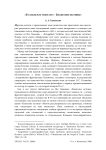Статьи журнала - Schole. Философское антиковедение и классическая традиция
Все статьи: 593
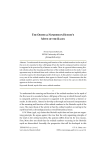
The ordinal numbers in Hesiod's myth of the races
Статья научная
To understand the meaning and function of the ordinal numbers in the myth of the races it is essential to have a full grasp of how the myth is composed and its structure is supposed to be perceived by a listener or reader. There is a general silence among Hesiod scholars about the meaning and function of the ordinal numbers in the myth. A tacit agreement may be inferred from such a silence: the ordinal numbers are implicitly taken to merely express the chronological order of the races. In this article, we examine each and every one of the ordinal numbers that appear in Hesiod’s myth. We demonstrate that the ordinal numbers preserve their hierarchical dimension even in the cases in which this appears to be less convincing.
Бесплатно
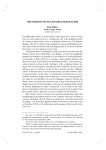
The origins of Platonists' dogmatism
Статья научная
John Dillon (Trinity College, Dublin) again turns to the problem of the origins of platonic dogmatism in the Ancient Academy. See also Rus. trans. his books The heirs of Plato (St. Petersburg, 2003) and the Middle Platonists (St. Petersburg, 2001). School controversy and rivalry between schools, initially between the Academy and Peripat, and then between Platonists, Stoics and Aristotelians, led to the fact that Platonism eventually became more formal than it was at the time of Plato, with Xenocrates primarily responsible for this development, which, in a number of treatises of a general and a private nature, laid the foundation for a new integral doctrine. It can not be asserted that the Platonists were inclined to monolithic orthodoxy. The teachings of Plato did not seem to them as something that came from above. Most likely, the school was a self-regulating system in which everyone as a whole understood what it meant to be a Platonist (and later a Pythagorean) and, from his point of view, passionately polemicized both with his colleagues and with representatives of other schools.
Бесплатно
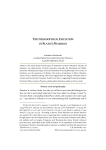
The philosophical initiation in Plato's Phaedrus
Статья научная
The article deals with the topic of "initiations" in Plato's Phaedrus. The idea of initiation was characteristic of Greek mysteries, especially the Eleusinian and Orphic mysteries, which played a large role in the formation of Greek philosophy. The essence of initiations was the experience of divinity. The motive of initiations in Plato's Phaedrus seems to have a similar meaning. This is also suggested by the allegory of human souls as chariots and the mystical “epopteia” motif woven into it, suggesting Eleusinian analogies.
Бесплатно
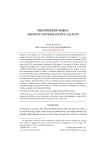
The power of semen: Aristotle and some Galen’s fallacies
Статья научная
In this paper, I try to demonstrate how critical empiricism and philosophical reasoning intertwine with each other and affected the development of medicine. It is a case study considering the problems of generation and semen in the writings of Aristotle and Galen via relationship between such concepts as matter, form, movement, change, causes and some others. The main question addressed in the paper is the reason of Galen’s return to Hippocratic paradigm of two-semina (male and female). I argue that the reason is two-fold: 1) Different philosophical reasoning and erroneous understanding of some aspects of Aristotle’s embryological model by Galen. 2) Empirical discoveries, which proved to be wrong. I demonstrate that Galen’s understanding of form/matter relationship, and his view on matter as an underling principle conditioned his understanding of the notion of physical change, that allowed him to speak about conception only as quantitative mixture between equal substrata. Finally, I show that Galen’s view on teleology and his limited understanding of formal/final vs efficient causes and their relationship forced him to claim the inadequacy of Aristotle’s biology and necessitated Galen to introduce emendations in definitions of seminal faculties of genders and reproductive fluids.
Бесплатно

The soul-parts as a cause of embryogenesis in Aristotle's De generatione animalium
Статья научная
In De generatione Animalium Aristotle proposes a theory of embryogenesis and indicates its causes. An account of embryo’s animation plays an important role in this theory. From the moment of conception foetus is generated as a living and animated being, and its actual soul appears as a principle of its development and growth. However, unless embryo comes to perfection its soul is also incomplete. The animation of the embryo is a process, which consists of successive actualization of its soul’s parts and powers. Parts of the soul are both the causes of generation and the actuality of yet non-perfected embryo. In this paper Aristotle’s conception of embryogenesis will be considered in the context of his doctrine of soul-parts and organic composition.
Бесплатно
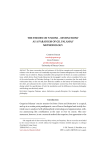
The theory of "union-distinction" as a paradigm of Gr. Palamas’ methodology
Статья научная
The issue concerning the real existence of the divine energies and consequently their relation to the divine essence is remarkably important for Christian Metaphysics. This study deals with the way in which Gr. Palamas included in this perspective the theory on unions and distinctions, which derives from Pseudo-Dionysius the Areopagite’s works, who is considered to be one of the main founders of Christian theology. It is also important to mention that the study deals with matters that, on the one side, have formed a tradition in the history of Christianity and, on the other, are subsumed in the context of the hesychastic controversy of the fourteenth-century, during which the specification of both the similarities and the differences between philosophy and theology was decisively raised.
Бесплатно
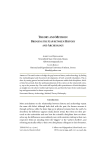
Theory and method: bridging the gap between history and archeology
Статья научная
This article aims to bridge the gap between history and archaeology by linking the methodological and theoretical developments of both scientific disciplines. This is done by tracing general societal trends and developments within both disciplines, divided into five periods, from the professionalization of the sciences in the nineteenth century, up to the present day. The result will hopefully offer practitioners of both disciplines an insight into the others’ intellectual framework, and thereby foster better understanding and opportunities for future cooperation.
Бесплатно
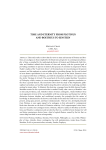
Time and eternity from plotinus and Boethius to Einstein
Статья научная
This article seeks to show that the views on time and eternity of Plotinus and Boethius are analogous to those implied by the block-time perspective in contemporary philosophy of time, as implied by the mathematical physics of Einstein and Minkowski. Both Einstein and Boethius utilized their theories of time and eternity with the practical goal of providing consolation to persons in distress; this practice of consolatio is compared to Pierre Hadot’s studies of the “Look from Above”, of the importance of concentrating on the present moment, and his emphasis on ancient philosophy as providing therapy for the soul, instead of mere abstract speculation for its own sake. In the first part of the article, Einstein’s views are compared with those of Plotinus, and with the elucidation of Plotinus’ views provided in the Arabic Theology of Aristotle. The second part of the article studies Boethius’ Consolation of Philosophy, which, contrary to recent interpretations, is indeed a genuine consolation rather than a parody thereof. The Consolation shows how the study of the Neoplatonic philosophical curriculum can lead the student along the path to salvation, by awakening and elaborating his innate ideas. To illustrate this doctrine, a passage from the little-known Pseudo-Boethian treatise De diis et praesensionibus is studied. Finally, after a survey of Boethius’ view on fate and providence, and Aristotle’s theory of future contingents, I study Boethius’ three main arguments in favor of the reconcilability of divine omniscience and human free will: the distinction between absolute and conditional necessity, the principle that the nature of knowledge is determined by the knower, and finally the doctrine that God lives in an eternal present, seeing past, present, and future simultaneously. This last view, developed primarily from Plotinus, is once again argued to be analogous to that advocated by contemporary block-time theorists on the basis of Eisteinian relativity. God’s supratemporal vision introduces no necessity into contingent events. Ultimate, objective reality, for Boethius as for Plotinus and Einstein, is atemporal, and our idea that there is a conflict between human free will and divine omniscience derives from a kind of optical illusion, caused by the fact that we cannot help but think in terms of temporality.
Бесплатно
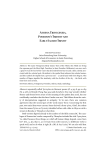
Tritogeneia, Poseidon's trident and early sacred trinity
Статья научная
The name Tritogeneia likely means ‘born of the Third’, this Third one being the supreme god, the Most High. Poseidon (at least Poseidon Helikonios) was once such a god. He was the lord of the water that descended from heaven and a deity closely associated with the celestial pole. His trident is the symbol that indicates his celestial nature, and this symbol developed from a previous one - a raised hand with three fingers. This number of fingers signified the similarity with the dwellers of the sky - the birds, with their three toes in front.
Бесплатно
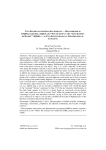
Статья научная
The article analyses and juxtaposes the images of the eschatological soteriological figures of Melchizedek in 11QMelchizedek (11Q13) and the “Son of God” in 4QApocryphon of Daniel (4Q246). Identifying the differences in the soteriological concepts reflected in 11Q13 and 4Q246, the author reaches the following main conclusions. God the Creator is transcendent to creation; Melchizedek is predominantly the spiritual head of the entire Universe (cf. also 4Q521, frag. 2, 2:1 of the “Messiah” of the Lord), who during the Eschaton will put an end to all the dark forces of creation led by Belial, atone for the sins of the worthy and retaliate against the sinful. As for the “Son of God” in 4Q246, his mission is mainly directed to earthly affairs, albeit on a global scale; he appears as a lay and military leader who comes at a critical moment to the aid of God’s people and is called to establish a just and righteous world order and in fact to become the sovereign of the united earthly kingdom. To a certain extent the image of the “Son of God” in 4Q246 may be compared with the personality of the eschatological “messenger who announces peace ( שלום )” (Isa. 52:7), i.e. establishes socio-political welfare on earth (cf., e.g., 4Q246, frag. 2, 2:5–6), and who is identified in 11Q13 2:16, 18 with the figure of the “anointed”/”prince” mentioned in Dan. 9:25 (the lay Messiah). Melchizedek, on the other hand, appears in 11Q13 as a divine figure on a universal, not just global, scale—one could even say like a second “God” within the created universe. As for the “messenger of good who announces salvation, saying to Zion: your God reigns” (Isa. 52:7), referred to in 11Q13 2:18–24, this is probably the Teacher of Righteousness of the Qumran community (the priestly Messiah).
Бесплатно
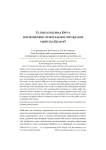
Ultimum dilemma Брута или возможно ли моральное оправдание убийства Цезаря?
Статья научная
Данная статья представляет собой исследование того, насколько может быть оправдано применение моральной и философской рефлексии при совершении преступления. Поступок - результат решения уравнения со многими переменными, преодоление противоречий правовых, нравственных, философских, эмоциональных. Однако современная правовая и этическая мысль абсолютизировала аргументы против убийства во всех его формах, закрыв тем самым путь для понимания его причин и мотивов. В качестве примера мы исследуем заговор и убийство Цезаря в Риме в 44 г. до н.э. В статье вскрываются объективные различия в понимании морали в античности и в современной этической науке. На основе сохранившихся документов той эпохи анализируются философские и этические основания, которые могли помочь в решение этой дилеммы. В первую очередь мы рассмотрели философско-политические работы и эпистолярное наследие Цицерона, размышления которого об обязанностях гражданина могли повлиять на решение Брута участвовать в заговоре против Цезаря и принять моральный выбор как свою судьбу. Брут действовал не как убийца, а как выразитель общественной цели и публичной пользы, для которого целью поступка было общественное благо, несовместимое с тиранией.
Бесплатно
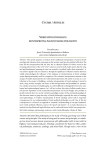
Veritative ontology: reinterpreting Ancient Greek philosophy
Статья научная
This article proposes a revision of the traditional interpretation of ancient Greek ontology and indicates what consequences this revision may have for political reflection. The basis for the interpretation laid out here lies in classicist Charles H. Kahn’s work on the meaning and function of the verb “to be” (einai) in ancient Greek. Kahn asserts that the original and fundamental meaning of einai was veritative (veridical) rather than existential – it was used to signify truth, not existence. Though the significance of Kahn’s research has been widely acknowledged, the influence of his analyses on interpretations of Greek ontology seems disproportionately small in comparison. The veritative interpretation remains on the margin of studies dominated by the existential interpretation. My article is meant as a contribution to the project of building a veritative interpretation of Greek ontology. I intend to show, using certain examples, the forms of this interpretation and possibilities it presents. For scholars of ancient Greek philosophy, it is often difficult to distinguish between its ontological and epistemological aspects. As I will try to show, this state of affairs results from a post factum imposition of the existential interpretation on Greek thought. The problem is greatly reduced when we use the veritative paradigm in place of the existential paradigm. It also becomes easier to grasp the unity of Greek philosophy, especially the unity of ontology and epistemology. A veritative interpretation of Greek ontology carries with it important consequences for our understanding of Greek political philosophy as well. One of the key consequences is a “formal” (as opposed to “material”) understanding of concepts fundamental to Greek political reflection, such as the “good” and “justice.” As a result, discussion on ancient Greek political and legal reflection can be conducted from a fruitful new perspective.
Бесплатно
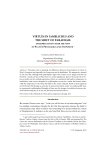
Статья научная
This paper aims at pointing out differences between the perception of virtues in Platos Protagoras and especially the Symposium and in Iamblichus. The argument is focused on the fact that, although both philosophers agree that virtues can be taught and they are therefore a social activity, in Plato there is a certain significance laid on the social role of virtues as well as on the cardinal importance of love as a sentiment that leads to temperance, in Iamblichus, what is more adequate for a philosopher to exercise is rather the hieratic values, while the temperance is the virtue that leads to the union with god. Based on that argument and in the fact that theurgy as a practice is more personal than social, we could possibly trace in representative philosophical thoughts of these eras the change of worldviews between classical and late antiquity, as, at any rate, the historical research shows.
Бесплатно
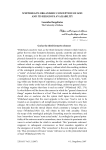
Whitehead's organismic conception of god and its religious availability
Статья научная
In the article of the professor of the University of Athens, Leonidas Bargheliotis, the organismic conception of God in the works of Whitehead is examined and shows how, within the framework of his metaphysical scheme, the British philosopher justifies the necessity of the existence of the first principle and determines its essential characteristics. Whitehead's first principle is compared with Aristotle's Armsman, and it turns out that the main "corrections" of the Aristotelian scheme by Whitehead can be read in value-oriented terms.
Бесплатно
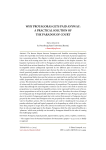
Why protagoras gets paid anyway: a practical solution of the paradox of court
Статья научная
The famous dispute between Protagoras and Euathlus concerning Protagoras's tuition fee reportedly owed to him by Euathlus is solved on the basis of practical argumentation concerning actions. The dispute is widely viewed as a kind of a logical paradox, and I show that such treating arises due to the double confusion in the dispute narrative. The linguistic expressions used to refer to Protagoras's, Euathlus's and the jurors' actions are confused with these actions themselves. The other confusion is the collision between the pairs of incompatible actions ambiguously expressed by two different pairs of sentences, one of which is a propositionally consistent pair whereas the other is an inconsistent one. The actional (practical) paradox solution aims to clear up these confusions by means of two core borderlines, propositional and expressive, drawn between the actions and the propositions. The propositional distinction says that actions are empirical facts and they lack truth values unlike propositions, which are mental entities and are often employed for referring to the actions. This distinction helps to avoid the confusion between the empirical incompatibility of actions and the truth-functional inconsistency of propositions. The expressive distinction claims that although the same linguistic sentences can be used to refer both to actions and propositions, two empirically incompatible actions can be expressed both by a pair of inconsistent propositions as well as by a pair of consistent ones. Therefore, the action of Protagoras's being paid may be linguistically symbolized in four different ways: Protagoras gets paid due to the verdict, Protagoras gets paid due to the contract that amount to Protagoras does not get paid by the contract and Protagoras does not get paid by the verdict respectively, and likewise for Euathlus's actions. The two distinctions are used for classifying the two groups of paradox solutions, legal and logical, proposed so far depending on which of the two confusions they purport to escape from. The actional reconstruction of the paradox suggests that there is only one single agent in the dispute, Protagoras, while the other named Euathlus is a ‘phantom,' which most probably was invented by Protagoras himself for the sake of creating this challenging sophism.
Бесплатно
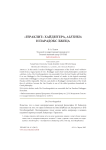
«Гераклит» Хайдеггера, Aletheia и парадокс лжеца
Статья научная
В этой статье я рассматриваю интерпретацию Хайдеггером греческого слова « aletheia » (истина) с логической точки зрения. Хайдеггер утверждает, что греческие философы связывали термин « aletheia » с «несокрытым» («Die Unverborgenheit»). Как же будет выглядеть «парадокс лжеца», если мы используем Хайдеггерово «Die Unverborgenheit» вместо понятия «истина»? Я утверждаю, что, если использовать понятие истины в смысле Хайдеггера, то ясной логической формулировки «парадокса лжеца» не получится. Это обстоятельство позволяет подвергнуть сомнению толкование Хайдеггера, так как «парадокс лжеца» - это один из древнейших парадоксов, сформулированных в греческой философии.
Бесплатно
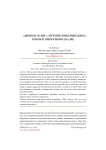
«Двоякое скажу»: аргументация Эмпедокла в пользу плюрализма (B 17 DK)
Статья научная
Часто ставится вопрос о том, что последователи Парменида приняли плюрализм необоснованно. Статья показывает, что фрагмент В 17 DK Эмпедокла может быть представлен как три последовательных аргумента в пользу множественности сущего: метафизический, онтологический и про-элеатовский. Кроме того, все рассуждение представляет собой интертекстуальный аргумент, то есть такой, который получает свою убедительность только в контексте того исходного, но сформулированного в другом учении аргумента, на который он отвечает. Обоснование плюрализма у Эмпедокла в В 17 DK становится ясным только в контексте рассуждений Парменида в В 8 DK.
Бесплатно
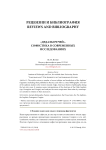
«Дедалы речей». Софистика в современных исследованиях
Статья научная
В статье предложен обзор работ, посвященных софистике (в том числе изданий фрагментов софистов) на русском языке, включая переводные издания, а также составлен критический библиографический обзор изучения софистики в западных исследованиях (преимущественно англо-американских) за последние 60 лет. Рас-смотрены основные интерпретации учений Протагора и Горгия. Дан обзор некоторых современных дискуссий вокруг этих персонажей.
Бесплатно
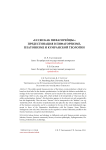
«Ессеи как пифагорейцы»: предестинация в пифагореизме, платонизме и кумранской теологии
Статья научная
В статье рассматриваются аргументы в пользу этимологии термина Ἐσσαῖοι / Ἐσσηνοί, основанной на важнейшем отличительном аспекте их учения – доктрине о предестинации. Именно, имеется в виду корреляции обозначения Ἐσσαῖοι / Ἐσσηνοί с арамейским понятием חשיא ḥaššayyā'. То есть «ессеи» – это «последователи судьбы», «фаталисты», те, кто верят в предопределение. В связи с этим рассматриваются ряд пифагорейских и платонических доктрин, которые могут быть соотнесены с учением о предестинации, что расширяет наши представления о фатализме в античном мире и проясняет, отчего Иосиф Флавий сравнивает ессеев с пифагорейцами.
Бесплатно

